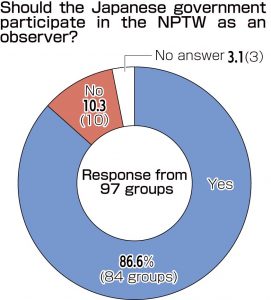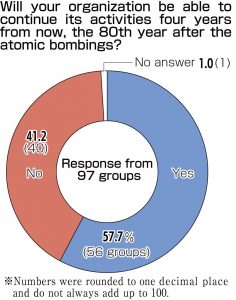86 % of Hibakusha groups say “Government should take part in meeting of State Parties” of TPNW, realties of atomic bombings should be conveyed: Survey
Jul. 26, 2021
A survey conducted by the Chugoku Shimbun found on July 28 that almost 90 percent of A-bomb survivors’ groups across Japan think the Japanese government should participate, even as an observer, in the meeting of State Parties of the Treaty on the Prohibition of Nuclear Weapons (TPNW), which entered into force in January of this year. While the government takes a negative attitude toward the signing and ratifying of the treaty, Hibakusha earnestly wish the government would be involved in the treaty through taking part in the meeting of state parties, and would convey the realities of the atomic bombing, the survey shows.
The annual survey has been conducted before the anniversaries of the atomic bombings since 2015, the 70th year after the bombings, except for 2018, when Western Japan suffered serious damage from torrential rains. The organizations covered by this survey include nationwide prefectural-level survivors’ groups and regional groups in the Chugoku region, comprised of Hiroshima and four surrounding prefectures. In this year’s survey, 104 organizations were asked to answer a questionnaire, and 97 groups, or 93.3 percent, responded.
The TPNW stipulates that countries that have not signed or ratified the treaty can participate in meetings of state parties as observers. But the Japanese government, which relies on the United States’ “nuclear umbrella,” is not willing to participate. To a question regarding whether the Japanese government should participate in the meeting of State Parties of the TPNW first as an observer, 84 groups, or 86.6 percent, answered “Yes.”
As for the reasons, “We hope the government will sign and ratify the treaty, but if they cannot, we want them to participate first as an observer. It will express to the world that Japan, the only country that experienced the atomic attacks, is interested in the treaty,” said the Hiroshima Prefectural Confederation of A-bomb Sufferers Organizations (Hiroshima Prefectural Hidankyo, chaired by Sunao Tsuboi). The other Hiroshima Prefectural Hidankyo chaired by Kunihiko Sakuma said, “The government should emphasize the tragedies of the atomic bombings and the horrors of such weapons.” A group that supports atomic bomb survivors in Fukuyama responded that the group hoped that the government would officially become a member, but that “In the first place, it is important to participate. This is a responsibility of the country that experienced the atomic bombings.”
Ten groups, or 10.3 percent, responded “No” to the same question. Some questioned the significance of participating as an observer, others expressed their concern over the government’s lack of influence. An association in Shizuoka Prefecture which supports atomic- and hydrogen-bomb sufferers said, “The government should ratify the treaty and officially participate in the meeting.” Three groups, or 3.1 percent, did not respond to the question.
To a question regarding whether they think their organization will be able to continue its activities four years from now, the year of the 80th anniversary of the atomic bombings, 40 groups, or 41.2 percent, responded “No.” As for the reasons, the largest group, at 97.5 percent of the total, cited “Aging of members.” The second largest group, 75.0 percent, cited “Lack of successors.” Multiple answers were allowed.
According to Japan’s Ministry of Health, Labour and Welfare, the number of Atomic Bomb Survivor’s Certificate holders was 127,755 as of the end of March 2021, falling under 130,000 for the first time. The average age of the certificate holders was 83.94, a record high. The survey shows that the aging of hibakusha has great impact on the activities of the groups.
How the survey was conducted
Questionnaires were sent by mail from the end of June. After responses were received, telephone or face-to-face interviews were conducted with some groups. The survey covered 104 organizations including prefectural organizations of the Japan Confederation of A- and H-bomb Sufferers Organizations (Nihon Hidankyo), the Hiroshima Prefectural Confederation of A-bomb Sufferers Organizations (Hiroshima Prefectural Hidankyo, chaired by Kunihiko Sakuma), the Tsuruoka Survivors Association in Tsuruoka, Yamagata Prefecture, and branches of prefectural Hidankyo and local associations in the five prefectures of the Chugoku region. Hiroshima Prefectural Hidankyo is an observer entity. Yamagata Prefecture has no prefectural organization of Hidankyo, but the Tsuruoka group has ties with Nihon Hidankyo. In our first survey conducted in 2015, which was the 70th year after the atomic bombing, 125 organizations were covered, but the number decreased as many groups have disbanded.
(Originally published on July 29, 2021)









